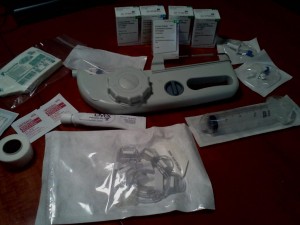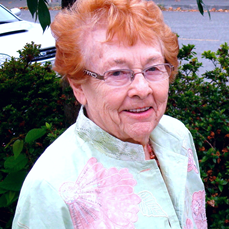by April | Nov 7, 2012 | Chronic Illness, CVID, Encouragement, Faith, PIDD, Prayer
 The other day, sick again (seriously!) I was at the doctor’s office seeing a fill-in because I couldn’t get into see my regular physician. As often happens, she didn’t have a clue what CVID was—and she wasn’t really up on primary immunodeficiency. And when I said IgG replacement a tiny light went on—but still, not getting it. (I make time to mention that she’s seen me twice before and hadn’t a clue).
The other day, sick again (seriously!) I was at the doctor’s office seeing a fill-in because I couldn’t get into see my regular physician. As often happens, she didn’t have a clue what CVID was—and she wasn’t really up on primary immunodeficiency. And when I said IgG replacement a tiny light went on—but still, not getting it. (I make time to mention that she’s seen me twice before and hadn’t a clue).
If you don’t know about CVID, then here’s a window: I went from a sore throat at 2:30 to full on bronchitis by 4:00. Colds hit fast, and hard! Considering I had pneumonia in September…well, you get the idea. It really wears down a person.
Anyway, I’m not blogging to come down on a doctor or whine about colds (tempting…but no). I’m sharing a change in attitude.
When I first started weekly subcutaneous IgG replacement therapy, I was hopeful, but scared (it’s a blood product after all, and stuff can go wrong). It involves pumps and syringes and needles—but I was so glad to have help, I did it. Then, at about 10 weeks, I started to have panic attacks—heart racing, sweat-breaking, hand shaing attacks (you get the idea). It got harder and harder to insert the four needle lines and sit there for 2 1/2 hours infusing, afraid to move. After much prayer, and changing some pre-meds, things got easier, and by 25 weeks I realized I needed to start thinking differently about IgG, or the stress would do me in. I started to picture the 90mls of fluid as friends (this came from some very early advice via a friend who’d overcome cancer a couple years ago). I came up with a positive sounding name for my treatment. Oh, and I prayed. A lot.
Guess what? It worked. So super well, that I’ve incorporated it into my thinking, and was brought up short at the doctor’s office, not realizing I’d used the term. When I got done explaining my rare condition, the doctor stared at me blankly. She asked, “What are these ‘immuno-buddies’ you keep referring to?”
I stared back at her and clicked through our conversation in my head. Yep. Instead of saying I was taking immunoglobulin replacement therapy, I’d said, “I guess my immuno-buddies haven’t had this bug yet.”
I went on to explain my thinking and what the term meant to me. She still looked a bit blank, but I wasn’t thinking about that. I was thinking about the turning point in my therapy/care of this disease. It felt like pure victory to me.
I’m not going to say it’s fun, or a breeze now, because it’s not—but I know this is helping me, strengthening me, and God’s answer for keeping me safe for now. Maybe one day they’ll come up with a daily infusion, like they have for diabetes (that’d be so very cool). But, for now, I have my weekly immuno-buddies.
Facing these kinds of challenges can either tax our strength and tear us down, or make us stronger depending on our attitude about it. I’m not saying it’s a quick fix or instant change, but with daily prayer and submission to the Father, we can be more than conquerors in this life.
Romans 8:31, 37-39 What, then, shall we say in response to these things? If God is for us, who can be against us? …No, in all these things we are more than conquerors through him who loved us. For I am convinced that neither death nor life, neither angels nor demons, neither the present nor the future, nor any powers, neither height nor depth, nor anything else in all creation, will be able to separate us from the love of God that is in Christ Jesus our Lord. (full text here)
by April | Oct 26, 2012 | Compassion, Faith, Grief, Love, Prayer
 I took my son to see his specialist the other day. While we were sitting there, he played with his Lego men and another mom sat reading a book to her son. Across the room, a couple held their daughter and made little jokes. It’s unspoken that we’re all there for a reason—our kids suffer from some sort of gastrointestinal illness. As we pretended we were there for ‘normal’ reasons, a woman entered, pushing her disabled young son in a raised wheel chair. As soon as the door opened, the boy made himself known. He wailed in a most heart-wrenching way.
I took my son to see his specialist the other day. While we were sitting there, he played with his Lego men and another mom sat reading a book to her son. Across the room, a couple held their daughter and made little jokes. It’s unspoken that we’re all there for a reason—our kids suffer from some sort of gastrointestinal illness. As we pretended we were there for ‘normal’ reasons, a woman entered, pushing her disabled young son in a raised wheel chair. As soon as the door opened, the boy made himself known. He wailed in a most heart-wrenching way.
As she checked in at the receptionist’s desk, his wails grew louder, more intense. He sobbed, screamed and then began a rasping gag. I surmised he had lung issues, with whatever other health issues he had. And he was one unhappy boy.
Everyone in the room immediately got quiet and tried looking at anything in the room except for the crying boy. My son’s hands stilled over his toys but, instead of looking away, stared openly at the other boy, his own eyes filling with tears. Mine soon followed. He looked up at me, face full of fear mixed with compassion. We’ve had a lot of moments these past four years that have made the frailness of life very apparent to us—but seeing someone so young suffering really hit home with Seth.
The boy’s sobs and rasps quieted as his very patient mother took off his coat and brushed her hands down his arms, adjusting his legs and shifting his Spongebob pillow behind his neck to make him more comfortable. It was then I noticed the boy’s earplugs. As the patients were called, they left the room with relief. I have to admit, I was hoping for our turn—as the boy still had not quit crying and gagging on phlegm. I felt tense from his screams and it’d only been fifteen minutes—and then I looked at the mother’s face. She seemed so alone. I wondered if she had anyone to lean on.
I put myself in her place, isolated, care-giving for her son all day long, and probably all night long as well. Exhausting. For them both.
Instead of acting like they weren’t there, I engaged her in conversation past his wails and rasps. I asked if he had breathing problems, and she said he’d suffered a brain injury so his lungs and muscles didn’t do what they were supposed to, to help clear things out. He was five. As she spoke, he calmed a bit and then another person entered the room and the door buzzer went off—and so did the boys cries.
I said, “He hates his chair, does he?” I don’t know what made me think that. I remember my own son, hating his car seat so much that he’d scream the entire time he was in it. He wasn’t uncomfortable, he wasn’t hurting, but he hated it and would scream bloody murder.
Her eyes lit up. “Yes, he does. And loud noises, they frighten him.” She motioned to the ear plugs. For a moment, we were just two mom’s visiting, sharing notes about our boys. Then it was his turn, and she gave me a grateful smile and wheeled her son into their appointment.
I looked down at Seth, still sitting quietly, thinking. “That was hard, wasn’t it?” I asked him, knowing full well he’d be thinking about the boy and how hard his life was for days. He nodded. “Let’s pray for that mom and boy, okay?” And he nodded again. We took some time right there to pray.
It’s our nature to avoid suffering. It’s hard and scary and it makes us feel insecure. Life can be like that. But I think worse than suffering, is pretending it doesn’t exist. There are people in pain all around us, even if they aren’t crying out—it’d do us all well to stop and listen, to be there and be compassionate. To come alongside them, a shoulder to lean on. And pray.
Romans 12:15 Rejoice with those who rejoice; mourn with those who mourn. (full text here)
Mathew 7:12 So in everything, do to others what you would have them do to you, for this sums up the Law and the Prophets. (full text here)
1 John 4:7-12 Dear friends, let us love one another, for love comes from God. Everyone who loves has been born of God and knows God. Whoever does not love does not know God, because God is love. This is how God showed his love among us: He sent his one and only Son into the world that we might live through him. This is love: not that we loved God, but that he loved us and sent his Son as an atoning sacrifice for our sins. Dear friends, since God so loved us, we also ought to love one another. No one has ever seen God; but if we love one another, God lives in us and his love is made complete in us. (full text here)
by April | Oct 20, 2012 | Encouragement, Faith, Jesus, Prayer, Uncategorized
 An email from a relative reminded me today that life is fragile. After watching his wife lay gravely ill in the hospital for the past week, its tenuous nature is more apparent than ever. He’s openly sharing struggles and triumphs. And their appreciation for prayer is apparent. In the midst of their trials, which are tremendous, he’s finding things to rejoice about.
An email from a relative reminded me today that life is fragile. After watching his wife lay gravely ill in the hospital for the past week, its tenuous nature is more apparent than ever. He’s openly sharing struggles and triumphs. And their appreciation for prayer is apparent. In the midst of their trials, which are tremendous, he’s finding things to rejoice about.
Oftentimes, though, it’s just the opposite. In talking with some whom I know are hurting, there seems a pervasive attitude that if they admit they have difficulties, this would cast some sort of shadow on God. They feel pressured to put on a happy face, not be sad, not grieve. I, myself, have been told this. Try as I may, it’s been hard for me to understand. But I think I’m finally glimpsing where it’s coming from.
We live in a sales orientated society. What can that product do for me? Watch out—if it doesn’t do what I expect, then I won’t buy it again.
I openly admit that my prayers haven’t always been answered. God is not a magic genie. He’s not my God because I can manipulate Him by saying certain words (seriously, do you want to worship a God you can manipulate?). I can pray, and if it’s not in God’s greater plan, whatever the reason, I won’t have my prayers answered the way I want. Does that mean God doesn’t love me? That I shouldn’t tell people about it, because then, when we’re sharing about God, they might not buy it?
Well, there’s the problem. God is not for sale. The relationship He offers through belief in Christ is free. In fact, Christianity is the only free religion. Free of guilt, free of doubt, freedom of forgiveness—you don’t have to work for it and you can’t pay for it. Grace is given to all who ask.
My God is mighty. Jesus came to save the sinner, the frail and the poor, the weak and the sick. He did not come to save us out of our circumstances, but in the midst of them. And in those trials, thanks be to Him, we can have great peace.
Mark 2:17 On hearing this, Jesus said to them, “It is not the healthy who need a doctor, but the sick. I have not come to call the righteous, but sinners.” (Full text here)
Philippians 4: 4-7 Rejoice in the Lord always. I will say it again: Rejoice! Let your gentleness be evident to all. The Lord is near. Do not be anxious about anything, but in every situation, by prayer and petition, with thanksgiving, present your requests to God. And the peace of God, which transcends all understanding, will guard your hearts and your minds in Christ Jesus. (Full text here)
by April | Sep 5, 2012 | Chronic Illness, CVID, Encouragement, Faith, homeschooling
 Comparisons happen in our minds all day long. How much more caffeine is in that 24 oz latte than the 16 oz? Is that spider bigger than the one I saw yesterday, or is that one of its many babies? If I use that super extensive homeschool curricula, will I churn out a gifted student poised to take on the world? (Can you tell we’re getting ready for our first year of homeschooling through high school?).
Comparisons happen in our minds all day long. How much more caffeine is in that 24 oz latte than the 16 oz? Is that spider bigger than the one I saw yesterday, or is that one of its many babies? If I use that super extensive homeschool curricula, will I churn out a gifted student poised to take on the world? (Can you tell we’re getting ready for our first year of homeschooling through high school?).
Comparisons are natural—it’s something our brain does without thinking about it. And that’s where the danger lies. Our eyes. I might see a house that is larger than my own and think about all that extra space I could use and become discontent. Or, see that super in-shape person on TV and be tempted to feel badly about my body. In our subconscious state, comparisons can turn to coveting before we can blink.
When I first entered this flare-up of CVID last year, I had well meaning people say, “It could always be worse.” Or, “You could be as sick as this other person, be grateful you’re not them.” I realized right then, that’s not a good scenario. Because in comparing myself to others, ill or well, rich or poor, gifted or normal, I’m going to be tempted to do one of two things: I’ll either gloat and feel self-righteous, or I’ll wallow and start to feel sorry for myself. Both are sinful.
It’s not an easy thing to do, to walk through this life and keep my eyes on God’s plan and off of what is happening in other people’s lives—to be objective. But, it’s something worth striving for. God’s got a different road for everyone to travel. It does Him a disservice if I’m always wishing I was someone else.
If you’ve been walking (reading) alongside me this past 18 months, you’ll know I’ve been awfully sick. The good news this week is that I’ve been administering immunoglobulin replacement therapy for 6 months now, and I’m about 60% better than I was last year at this time. That is HUGE. I’m so grateful to God for treatment for my illness.
If you’re suffering and are waiting for healing, please know that God hears your prayers—and He’s got a plan for you. It might involve miraculous healing. It might involve being healed through modern medicine (for which I’m very grateful, because I’d be long dead from any number of things by now). But, whatever happens, whatever the path, He’s on it with you. He promises that to His children. Keep your eyes on Him.
Deuteronomy 31:6 Be strong and courageous. Do not be afraid or terrified because of them, for the Lord your God goes with you; he will never leave you nor forsake you.”
Hebrews 13:5 Keep your lives free from the love of money and be content with what you have, because God has said, “Never will I leave you; never will I forsake you.” So we say with confidence, “The Lord is my helper; I will not be afraid. What can mere mortals do to me?”
Would you do me a favor? If you like what I’ve written, please share it with someone else 🙂 And I’d love to hear your comments and thoughts!
by April | Jul 12, 2012 | Chronic Illness, Encouragement, Faith
 Have you ever noticed how much people like to give advice? The other day my son had the hiccups—all day. We had tons of errands, and every time someone heard him hiccup, they’d offer him a sure-fire way to get rid of them. Wouldn’t you know it, every bit of advice was different from the next. These sage words came from a receptionist, a nurse, a doctor, the grocery store clerk, his sister and myself.
Have you ever noticed how much people like to give advice? The other day my son had the hiccups—all day. We had tons of errands, and every time someone heard him hiccup, they’d offer him a sure-fire way to get rid of them. Wouldn’t you know it, every bit of advice was different from the next. These sage words came from a receptionist, a nurse, a doctor, the grocery store clerk, his sister and myself.
Hold your breath. Stand on your head. Drink a glass of water from the other side (okay…what? All that gets you is a wet front!). Hold your nose. Rub your tummy. Take long, controlled, deep breaths. Oh, this one is from my sister and passed on by me—eat a spoonful of sugar (he chose not to, sorry Chelli). He was assured each of these was a proven cure.
Guess what? I know. Yours works and I should have called you first. Sorry. Anyway, none of these worked! They naturally went away some time in the night, and he awoke to a hiccup free day.
Have you ever been given erroneous advice? When I was first so ill, I was given a truckload of advice by the well-meaning and by the meddling (don’t worry, you weren’t the meddling type, I don’t even see them anymore). Most people want to help. And most people have things that really have helped them, and they’re sure it’s going to help you, too. I get that. I’m a researcher, I tried everything I could think of on my own, and a bunch of other stuff that didn’t help a bit. But sometimes…you have to wait.
I waited a long time for the right treatment to come along and make me feel better (42 years). It wasn’t a quick fix, and it’s not sure-fire, but it’s working for me. It’s not a fun thing to infuse immunoglobulin subcutaneously (or for my IvIG friends, intravenously). I’m happy to say, that after 25 weeks of treatment, I’m finally starting to feel better. It’s an amazing thing, feeling good. If you already feel good, then revel in it, roll in it and keep it close. I’ve talked about my little windows of feeling better. The last week or so I’ve had several consecutive hours of feeling better. Not an entire day of it, but huge happy chunks. Enough to know I’m improving.
Waiting is hard. We’re a proactive people. We like action and immediate solutions. Easy answers are best. Patience is NOT a virtue associated with our lives. But a lot of the time, we just have to hang in there, hold on and pray. And pray some more.
Have you ever been given erroneous advice? Did you take it? What happened?
Psalm 27:14 Wait for the Lord; be strong and take heart and wait for the Lord. (Full text here.)
by April | Jun 2, 2012 | Faith, Grief, Love, Thankfulness
 The past few years have been a struggle for my family health-wise. I’ve shared as much on my blog. This has made it hard for us to take vacations. But a couple months back, we planned one down to northern California, to see a good portion of our family—one of those being my Granny who, at the age of 96, was declining in health.
The past few years have been a struggle for my family health-wise. I’ve shared as much on my blog. This has made it hard for us to take vacations. But a couple months back, we planned one down to northern California, to see a good portion of our family—one of those being my Granny who, at the age of 96, was declining in health.
Unfortunately, we didn’t get there in time, but were able to attend her memorial. And while I love to write and do pretty well with my fingers on the keyboard, I’m not much of a speaker. I mean, I do fine—but it’s hard for me to talk in front of people, and especially difficult during such an emotional time. So, I waited until now.
I’ve been very blessed to have a number of grandparents in my life. I have four parents (due to remarriage), and were able to know most of their parents, and even a couple of their grandmother’s.
Both Granny, and her mother, Grandma Lind, were instrumental in my life. My mother and I moved to northern California when I was ten. To say I was lonely is a huge understatement. It was just a few short months later that my mother met and married my step-father. And thus, I was thrust into a new family with grandparents and a brother and sister (who were out of the house by my arrival), aunts and uncles and cousins. I felt very uneasy, and didn’t know what to expect.
Both Granny and Grandma Lind took me right into the family. If there were any doubts they had about me, I never knew it. As soon as my parents said, “I do” I was a grandkid and that was that. I can’t tell you what it meant to me to be accepted so quickly.
Granny was expert in making just about anyone feel at home, and I did. So much so, that one time, when she was babysitting me, I noticed that the clock on the piano was an hour off (Daylight savings time had come and gone). So, I fixed it. She had a funny look on her face when I told her how I’d taken care of it for her. I had no idea that a professional needed to set that clock…that expensive mantle clock. But, after explaining it to me, it was never mentioned again. I discovered later it had been quite expensive to repair. I kept a clear path between that clock and me from then on.
She loved music, and during a period of time when I was taking piano lessons, let me come over and practice at her house. I’m sure she must have gotten pretty tired of hearing me play the same pieces over and over again (I use the word play loosely)—but she just smiled and encouraged me. I never really mastered it, I wish I had.
Granny loved clowns and had a collection of figurines and pictures. One Halloween, I was about thirteen, I decided to be a clown for trick-o-treating. My friends and I canvassed the whole town (it felt like) and I needed to use the bathroom. We were nearby Granny’s house, so I knocked on the door. She answered and gave me a candy. I asked, “Can I use the bathroom?” Well, I’d never seen an incredulous look on her face before, but sure gave me one. When I stepped inside, she kindly asked me to leave, took me firmly by the arm and escorted me out, shutting and locking the door, flipping off the porch light. To say I was shocked didn’t begin to explain my feelings. My grandmother had just tossed me from the house! As I was standing in the dark, wondering what happened, I realized she had no idea who I was. So, I started knocking again. After a minute, she flipped on the porch light, opened the door a crack and told me to go away in a very stern voice. Had I been the miscreant she took me for, I’m sure I would have turned tail and ran. Instead I said, “But, Granny, it’s me, it’s April!” She was just as relieved as I was. I apparently made a very convincing clown.
Years later, when I got engaged, she lovingly sat my fiancé and I down and asked what our plans were (we were pretty young). She was matter-of-fact, yet kind. And over the twenty plus years we’ve been married, unendingly supportive.
People at her memorial talked about her classy appearance (always dressed to the nines); her love of travel (was even asked by a native New Guinea man to be one of his wives); her love of sporty cars; how she walked in her faith every day of her life, reaching out to strangers and making them feel like a friend. She so did. But, for me, I’ll always remember how she looked at this lonely ten-year-old girl and took her as one of her own—no questions asked—and loved her. Thanks, Granny.
 The other day, sick again (seriously!) I was at the doctor’s office seeing a fill-in because I couldn’t get into see my regular physician. As often happens, she didn’t have a clue what CVID was—and she wasn’t really up on primary immunodeficiency. And when I said IgG replacement a tiny light went on—but still, not getting it. (I make time to mention that she’s seen me twice before and hadn’t a clue).
The other day, sick again (seriously!) I was at the doctor’s office seeing a fill-in because I couldn’t get into see my regular physician. As often happens, she didn’t have a clue what CVID was—and she wasn’t really up on primary immunodeficiency. And when I said IgG replacement a tiny light went on—but still, not getting it. (I make time to mention that she’s seen me twice before and hadn’t a clue).




